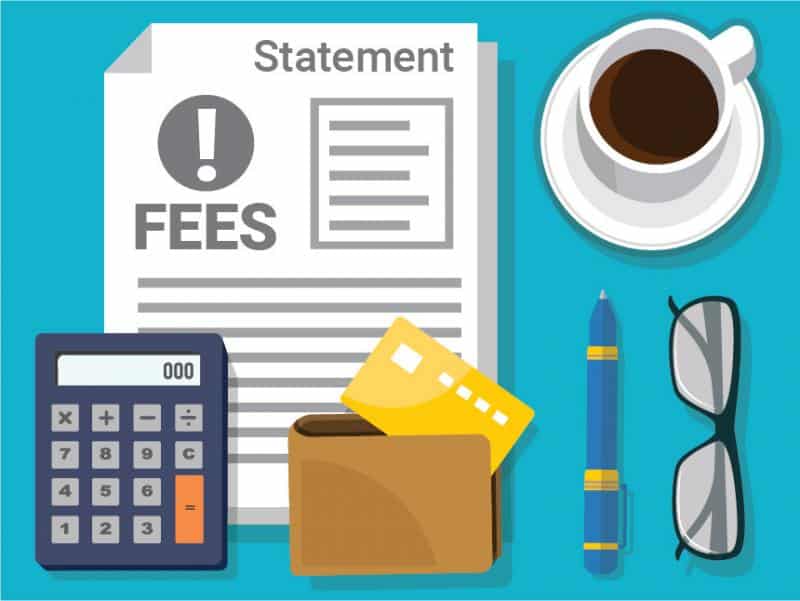When you make a payment with insufficient funds in your checking account, one of two things happens: your bank will either cover the payment or will not.
Both scenarios are undesirable, as they would result in payments. However, the second scenario is referred to as “bouncing” a bill, and it can result in additional third-party charges as well as your bank’s nonsufficient funds (NSF) fee.
According to the Center for Responsible Lending’s analysis of FDIC results, NSF fees cost Americans billions of dollars per year. You can, however, stop them if you know how.

What does a fee for Nonsufficient Funds (NSF) entail?
When you bounce a deposit/payment, the financial institution charges you a nonsufficient funds, or NSF, fee. If you want to deposit or cash a check and the issuer doesn’t have enough money in their account to cover it, you could be charged an NSF fee. There are a few other scenarios in which you could be charged an NSF fee, which we’ll discuss later.
Bounced payments and NSF fees can be costly in a variety of ways.
Basically, if your payment isn’t processed, the payee (the individual or company that was supposed to be paid) will charge you a returned-check fee in addition to the NSF fee your bank charges you. If you don’t remedy the situation, you may face late payments or service cancellations, and your account may be handed over to a collection agency.
Furthermore, missing a payment on an account that is recorded to the credit bureaus will harm your credit.Howe
However, overdraft fees are not the same as NSF fees, which we’ll go over in more depth later.
Is it legal to charge NSF fees?
Yes, indeed. If there are insufficient funds to cover a transaction, banks and credit unions can charge a fee. These fees are set by each financial institution. Although the federal government does not regulate fee rates, states normally regulate the maximum amount that financial institutions can charge.
For the most part, when you open an account, the Truth in Savings Act allows all banks and credit unions to provide you with a fee schedule that outlines and explains all fees. It’s crucial that you read it and your account agreement carefully so that you’re aware of any possible charges.
Is it possible to get a refund for NSF fees?
NSF fees are not required to be waived or refunded by banks. However, it’s worth asking if your bank will refund an NSF fee; the bank can be willing to work with you. Some institutions also have fee-waiver services in place if you meet certain criteria.
How much do NSF fees cost?
According to the FDIC, the average fee for overdrawing an account in the United States is about $30. However, depending on your bank and its policies, fees will vary from $10 to nearly $40.
However, since financial institutions aren’t needed to alert you when a check bounces due to a lack of funds, NSF fees may quickly add up. You may incur several penalties as a result of a single miscalculation of your checking account balance. Oftentimes, you may not be aware of until these you receive your statement.
Here’s an example of how NSF fees can mount up.
You believe you have $300 in your checking account, but you aren’t positive. But, because you’re expecting a deposit soon, you go ahead and write some checks: $10, $65, $185, and $350, in that order. What could possibly go wrong?
- Mistake 1: You’ve already placed your account at risk of being overdrawn by miscalculating the balance available in your account. In the future, you can prevent this by always checking the available balance on your account or through your online account before making payments.
- Mistake 2: You wrote checks for more than you thought you had in your account. Writing checks for more than you have in your account is never a good idea — and let’s hope the deposit you were expecting was just marginally delayed in this case (even the most dependable deposits can hit later than expected sometimes).
- Mistake 3: You reasoned that the bank must pay the checks in the order in which they were written. Your bank, on the other hand, is free to post payments to your account in any order that is consistent with its stated policies. Assume the $350 check is the first to be posted by the bank. What then is the end result? For the $350 charge — and the three audits that follow — your account is automatically overdrawn. As a result, you will be charged an NSF fee for all four payments. You could owe up to $140 in fees if your bank charges a $35 NSF fee.
That’s a steep price to pay, and that’s before any possible fines from the bounced check’s recipient.
When am I likely to be charged an NSF fee?
It’s easy to imagine what could cause a check to bounce and result in an NSF fee. But when will the charge be applied to your account?
Nonsufficient funds checks
When anyone deposits a check you’ve signed, their financial institution is usually required to act within two business days to make the funds available to them (although there can be exceptions).
If you don’t have enough funds in your account to cover the check, your bank will probably notice right away, which means the fees will appear in your account not long after your payee attempts (unsuccessfully) to cash or deposit it.
Fraudulent checks
A bank’s detection and bounce of a fraudulent check will take weeks. So, if you deposit a bad check that someone else sends you, it might take some time for the bank to find it out, reverse the deposit, and charge you some NSF fees.
Transactions using a debit card
If your debit card transaction is rejected, you will most likely not be charged an NSF fee. In most cases, banks are unable to charge NSF fees for debit card purchases that are rejected due to a lack of funds.
What’s the difference between an overdraft charge and a non-sufficient funds fee?
NSF fees are charged by banks and credit unions on checks and electronic transfers that aren’t processed due to insufficient funds, resulting in the payee not receiving their funds.
Many financial institutions, on the other hand, provide overdraft insurance, which can cover expenses even though you don’t have enough money in your account to cover them. Your payment is processed, but the bank charges an overdraft fee.
Many banks, in general, automatically have overdraft insurance to cover checks or electronic ACH payments. You must, however, opt in to obtain overdraft insurance for debit card transactions. If you don’t, and your account doesn’t have enough money to support the transaction, it will be declined.
Overdraft and insufficient funds fees are normally charged at the same rate by banks.
How do you avoid NSF fees?
If you’re not careful, NSF fees will add up quickly. Here are a few pointers to help you stay away from them.
Keep track of your spending
Make a note of all debits from your account in your checkbook, including paper checks, electronic transfers, debit card transactions, and ATM withdrawals.
Keep an eye on the balance of your checking account
Regularly check your account balance to see how much money you have. Keep in mind that your account balance does not represent every check or electronic transaction you’ve scheduled. Even if your bank contains pending transactions in your available balance, it cannot include transactions it is unaware of, such as the check you wrote for your niece’s graduation present that she has yet to cash.
Your checking and savings accounts should be connected
If you connect your accounts, money will be transferred automatically from savings to checking if your checking account is insufficient to cover a transaction. You’ll almost certainly be charged a transfer fee, but it’ll normally be less than an NSF fee.
Have a cash reserve
Leave some cash in your bank account aside from what you need to pay for your monthly bills. If you fail to report a withdrawal or miscalculate your balance, you’ll have some leniency.
Set up low balance notifications
Some banks allow you to receive updates when your account balance falls below a certain threshold. This lets you know when it’s time to stop making withdrawals or make a deposit.
What Is a NSF Fee Charge?
What are NSF fees? Banks typically assess an NSF fee when an account lacks sufficient money to complete a transaction and the bank refuses to process the transaction. This may result in failed checks or rejected electronic bill payments.
How Do I Get My NSF Fee Waived?
Different banks have different rules, but an NSF fee can often be removed with an NSF reversal, especially if it’s the first time it’s been charged. The best thing for a customer to do is call the bank’s customer service line and ask for a refund.
Why Do Banks Charge a NSF Fee?
NSF fees are charged by banks and credit unions for checks and electronic payments that can’t be processed because the payee doesn’t have enough money.
Does NSF Give Out Money?
The NSF has a long-standing process for deciding which research and research-related grants to give out. This process is called “merit review.” The foundation does not give money to people for their own use.






